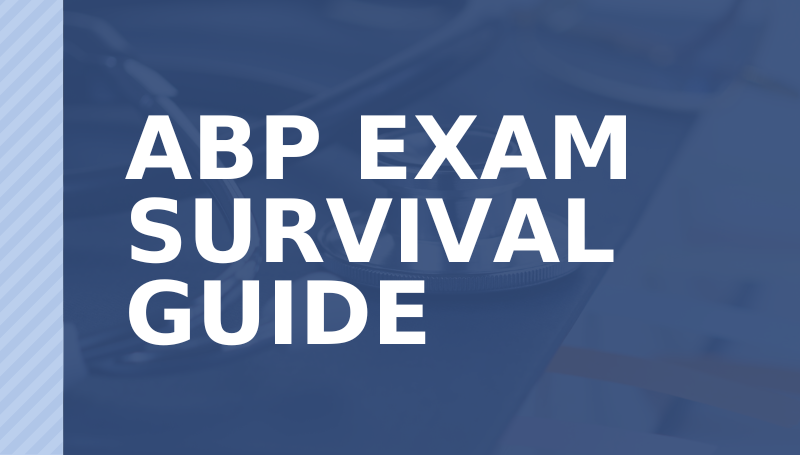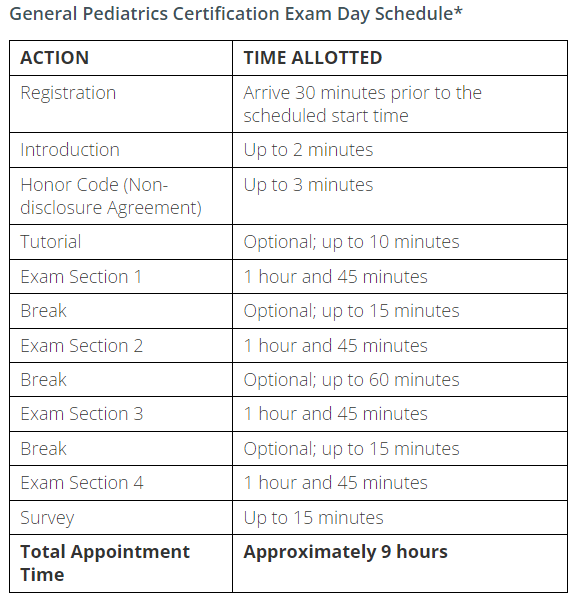The Complete Guide to the Pediatric Board Exam

Key takeaways
- The General Pediatrics Certifying Examination is a rigorous and comprehensive exam administered by the American Board of Pediatrics (ABP) designed to assess the knowledge, skills, and clinical judgment of physicians who have completed a pediatric residency training program and are seeking board certification in general pediatrics.
- The Pediatric Board Exam covers a wide range of topics related to pediatric medicine, including growth and development, preventive care, acute and chronic conditions, behavioral and mental health, and adolescent medicine. There are 25 different content domains covered, and each one is detailed in the exam content outline.
- There are 330–350 multiple-choice, single-best-answer questions split into 4 exam sections. You will get a short break between each section.
- Total time allotted for the exam day is 9 hours including registration, breaks, etc.
- Your score is based on the total number of questions you answered correctly—no points are deducted for questions answered incorrectly. The passing score is established through a process called standard setting, and since there are several different examination forms, there is no single set number or percentage of questions to answer correctly to pass.
Whether you're getting certified for the first time or maintaining your certification, the pediatric board exam is one of the most rigorous exams you’ll ever take! It requires months of preparation.
The first part of that preparation is understanding:
- How the ABP exam is structured
- What material is covered in the pediatric board exam
- How to create a study plan for the ABP boards
- What to expect on exam day
Ready to check this item off your to do list? We thought so. Let's get started.
What is the pediatric board exam?
The pediatric board exam—also known as the General Pediatrics Certifying Exam—is a 330- to 350-question comprehensive examination administered by the American Board of Pediatrics (ABP). It's designed to assess the knowledge, skills, and clinical judgment of physicians who have completed a pediatric residency training program and are seeking board certification in general pediatrics.
The purpose of the exam is to ensure that certified pediatricians possess the necessary expertise to provide high-quality care for infants, children, and adolescents. Passing the Pediatric Board Exam demonstrates that a physician has met the highest standards of competence in the field of pediatrics and is committed to lifelong learning and continuous improvement.
Pediatric board exam dates
| Exam Date | Registration Date | Late registration | Fees |
|
October 15, 16, or 17, 2024 |
1/16/24–4/1/24 Cutoff time 8 p.m. ET |
4/2/24–5/20/24* Cutoff time 8 p.m. ET |
$2,288 *Additional $345 fee for late registration |
How long is the pediatric board exam?
There are 330 to 350 multiple-choice, single-best-answer questions on the Pediatrics Certifying Exam. Pediatric Board Exam questions are split into 4 exam sections, and each section is 1 hour and 45 minutes. You will have about 72–75 seconds to answer each question on the pediatric board exam.
You will get a short break between each section. The pediatric board exam is taken on a single day—you'll spend 9 hours including registration, breaks, etc. in the Prometric testing center.
How hard are pediatric boards?
The General Pediatrics Certifying Examination is incredibly challenging—the 2022 pass rate is 80%—because it's very comprehensive and covers a wide range of topics. You need to have a deep understanding of pediatric medicine, including growth and development, preventive care, acute and chronic conditions, behavioral and mental health, adolescent medicine, and more. And you must be able to demonstrate the ability to apply this knowledge in clinical scenarios and make appropriate decisions regarding patient care.
Pediatric boards pass rates
The pediatric board exam is scored on a scale, and the passing standard is a score of 180.
Over the past few years, the ABP pass rate for first-time test takers in General Pediatrics has been trending down:
- ABP General Pediatrics certification pass rate for 2023: 82%
- ABP General Pediatrics certification pass rate for 2022: 80%
- ABP General Pediatrics certification pass rate for 2021: 81%
- ABP General Pediatrics certification pass rate for 2020: 87%
- ABP General Pediatrics certification pass rate for 2019: 87%
- ABP General Pediatrics certification pass rate for 2018: 91%
What is the first time pass rate for pediatric boards?
In 2023, 82% of physicians who took the Pediatrics Certification Exam passed.
What is the passing score for pediatric boards?
The passing score is established through a process called standard setting, where a panel of practicing pediatricians determines the level of knowledge a candidate must demonstrate in order to pass the examination. The standard established is based on a criterion-referenced model and represents a specific standard of performance required. Since there are several different examination forms, there is no single set number of questions or percentage of questions to answer correctly to pass.
Your score is based on the total number of questions you answered correctly—no points are deducted for questions answered incorrectly. Again, the passing standard is a score of 180.
What is covered in the general pediatrics certifying exam?
The Pediatric Board Exam covers a wide range of topics related to pediatric medicine, including growth and development, preventive care, acute and chronic conditions, behavioral and mental health, and adolescent medicine.
There are 25 different content domains covered on the General Pediatrics Certifying Exam, and each one is detailed in the exam content outline. Each content domain is weighted, so plan your study time accordingly!
The content outline also describes 4 "universal tasks" that reflect how pediatric knowledge can be applied in clinical practice.
| Basic Science and Pathophysiology | Understanding best practices, clinical guidelines, and foundational pediatric knowledge, including normal and abnormal function of the body and mind in an age-specific development context |
| Epidemiology and Risk Assessment | Recognizing patterns of health and disease and understanding the variables that influence those patterns |
| Diagnosis | Using available information (eg, patient history, physical exam) to formulate differential diagnoses, choose appropriate tests, and interpret test results to reach a likely diagnosis |
| Management and Treatment | Formulating a comprehensive management and/or treatment plan, including reevaluation and longterm follow-up, taking into account multiple options for care |
How to pass the pediatric board exam
The exam could seem daunting if you don’t know what you're getting into! The best way to prepare for your pediatric boards is to know what to expect from the exam. Here are our 13 tips on how to pass the board exam.
You can use a variety of formats to study for your pediatric board exam—qbanks, videos, review course, books, flashcards, and audio are all viable options! You should do a comprehensive review to make sure you have a complete understanding of the material that's covered on the pediatric board exam.
Once you know what is on the exam and you have your study materials, choose your study approach. Start studying at least six months before exam day. Also, use a variety of study methods that are proven by learning science to help you remember more of the information for longer.
Not sure where to start? Check out our pediatric board exam review playlist of Q&As, Flashcards, and more:
Your pediatric boards exam day schedule
Research your ABP exam day schedule along with which testing center to report to, what to take with you (and what to leave at home!), and when breaks are. This will help you understand what exam day will look like for you, so you know exactly what to expect.

How long is pediatric board certification good for?
Your general pediatrics initial certification is good for 10 years—at the end, you will enter into a 5-year ABP MOC cycle. Most pediatricians choose MOCA-Peds as their default path.


